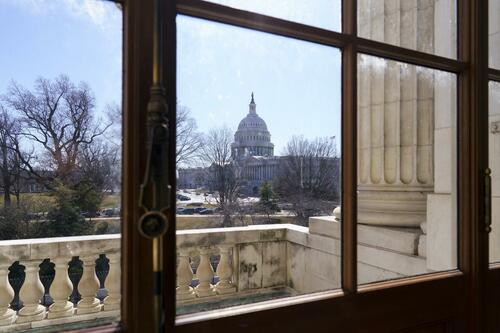A Case For Government As A Borrower To Limit Tyranny
Submitted by Gary Marshall, first published in Real Clear Markets. Gary Marshall is a Public Finance researcher living in Winnipeg, Manitoba, Canada. He can be reached by email at grimmer9 at gmail.com or through his website at www.economart.ca.
Many are resigned to the belief that salvation from the perpetual destruction of wealth, property and life by those directing ruinous government is a myth. But, an end of government tyranny is within our grasp, and a little exercise in thought and reason should reveal the solution to all our economic ills and slay this monster forever.
I have detailed two facts in Public Finance that most in the field ignore perpetually and inexplicably. The first: that government is in deficit to the whole of its expenditures, that it has no money or funds with which to pay its bills, that taxpayers, rather resident citizens, and specifically their property, assets, and incomes fund government and all of it.
The second: that it makes no difference whether government taxes or borrows from the collective of the assets, property and incomes that comprise the source of government funds, that a superficial equivalence exists between Taxation and Borrowing in raising funds for public expenditures.
I use the phrase ‘superficial equivalence’ because Taxation and Borrowing are not the same. Taxation bears immense costs in government waste and in deterrence that disappear with Borrowing.
We are all familiar with government waste. Though government does supply a small number valued public goods, the majority of funds that pass into its control are squandered on politically useful, but dubious, harmful, and barren undertakings. The politicians and their employ eagerly institute regulations and laws for their own benefit, favored voting blocks, and the special interests that dominate them at great cost to us all.
But the greater and generally unaccounted cost inherent in Taxation is its weighty and poignant role as deterrent. The same instrument, essentially a fine or punishment, used to penalize speeders and criminals is used to raise funds for public expenditures. As it is with fines and the lawless, so it is with tax levies and the productive. The ubiquitous scourge of Taxation persecutes and chases away enterprising and hard-working spirits, and we are all poorer for it.
With the institution of full Public Borrowing, with the financial inducement of interest and eventual return of all principle these costs shall disappear. With deterrence erased the productive class shall thrive through full enjoyment of the rewards of their efforts, not penalized with the loss of large fractions of income. Worthy economic activities squelched, halted, curbed, delayed or concealed will of a sudden re-emerge and resume. Firms and people having sought tax refuge elsewhere will have every reason to return.
With a capital charge imposed, government must borrow funds instead of eagerly and obnoxiously confiscating them by daily entering the financial markets. The people, former taxpaying slaves transformed into Public Bankers, shall become the arbiters of which public expenditures are worthy and which are not. When private bankers fail to adhere to prudent lending practices and endanger the financial health of the institution, depositors withdraw and move funds elsewhere. Government, perpetual dependence imposed, must embrace sound financial measures, must embrace cost and benefit analysis in all undertakings. If it should falter, government shall find itself starved of funds until the perpetrators of waste or corruption are replaced.
Suppose we have an economy producing 100 units per year with 40 units allotted to government and the remaining 60 units left to the rest of the people. With the institution of full Public Borrowing, one would expect government expenditure to decline sharply. I estimate that about 75% of public expenditures go to waste. If correct, the size of the government’s allotment should reduce from 40 units to 10.
I estimate the deterrent effect upon the economy at approximately 35% in an economy with a 40% tax rate. If correct, the economy should grow steeply in size, from 100 units to 135.
An economy of size 135 less 10 units for government would deliver 125 units to the people, beyond a doubling of the former allotment of 60. This explosion in wealth and prosperity would have no precedent in history. The same outcome repeats the following year and into perpetuity, the initial explosion in wealth building upon itself, compounding such that accruing assets always outpace accruing liabilities by at least 4 to 1.
There may be some dispute about the size of government waste and the effect of deterrence and, thus, the size of the incomparable augmentation of wealth. But the direction and result is clear.
Some have argued that none would lend to a government bereaved of the means of Taxation. By simple calculation, the increase in assets, 65 units, far surpasses the incurred liability of 10 units. How is a community so enriched, its Public Credit so enhanced by the abolition of all Taxation unable to provide security to or repay its lenders? It would be as if lenders turned away the wealthiest corporation in the world.
A learned community would never persist with taxing resident citizens when enlightened as to its punishing costs. With the stagnant, medieval fields of economics once again rendered fertile, a declaration uttered by the authorities of a small town, city, province, state, region or nation would set the many peoples of our world, united in purpose, on a blessed and enriching path. Abolish all Taxation and institute full Public Borrowing, and I guarantee the meek, suffering poverty and tyranny, shall inherit the earth as prophesied by a great man long ago.
Tyler Durden
Tue, 05/31/2022 – 23:00
via ZeroHedge News https://ift.tt/wrdqJgO Tyler Durden
